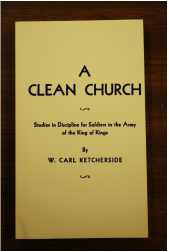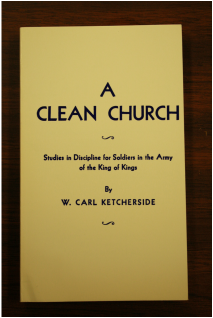
A Clean Church
by Carl W. Ketcherside
Reviewed by Greg Cardosa
The book begins by looking back at the failure of the Israelites in their first attempt to take the city of Ai due to Achin's sin. Ketcherside points out several principles that parallel the problem of "sin in the camp" within congregations of the Lord's church. After defining discipline, he moves on to a discussion of handling personal offenses according to the pattern found in Matthew 18 and then addresses brethren going to law by applying the teaching of I Corinthians 6: 1-8. In these last two sections, examples are given to show how to apply the principles given in the scriptures. The next two chapters discuss restoring those who go astray and the positive effects of discipline on the offender, the church and the world. After this the writer discusses the withdrawal of fellowship from the disorderly walker as taught in 2 Thessalonians 3 and the immoral brother in 1 Corinthians 5 (Note: Ketcherside extends the scope of a disorderly walker beyond the context of 2 Thessalonians 3:6-15 to include one who willfully forsakes the assembly - while this is sinful I do not believe it fits the context). He then has a chapter titled Congregational Autonomy in which he clearly points out that a member of the church must have a home congregation to which he is responsible and that a congregation should receive one only with the recommendation of the congregation from which he came. In this chapter he also shows how other congregations should honor a withdrawal of fellowship by not accepting the erring one or retrying his case. Next is a discussion on certain principles to apply regarding who should approach one going astray and how to go about it depending on the situation. Finally the book concludes with the author answering anticipated objections and a chapter on how to avoid being disciplined - mainly by self-discipline.
While this is not an exhaustive work on the subject of church discipline, it will give the reader a good understanding of why it is needed and how to administer it. It is fairly easy to read and brief enough to keep one from being overwhelmed. Even though this is a somewhat older work, it is still useful today. The need for discipline still exists and will until the Lord returns. Yet church discipline is not practiced in some cases and we see the leavening influence of sin hurting congregations of the church across our brotherhood. This book will help to inform, equip and motivate brethren to do what is needed to have "A Clean Church".


 RSS Feed
RSS Feed
